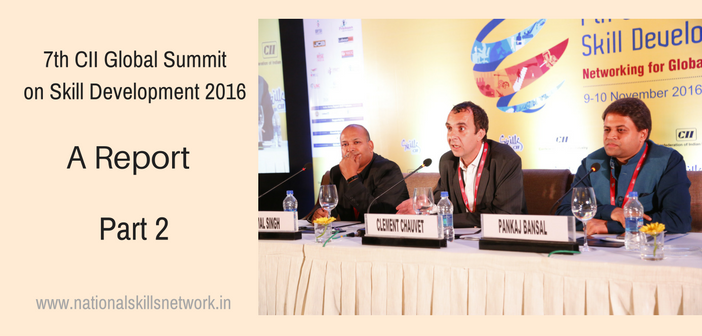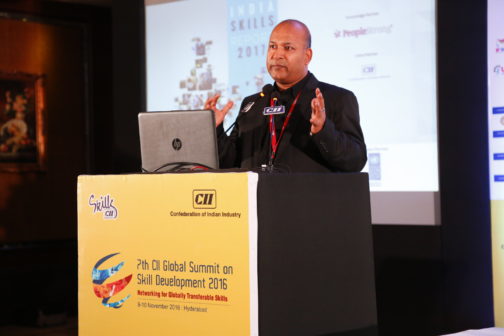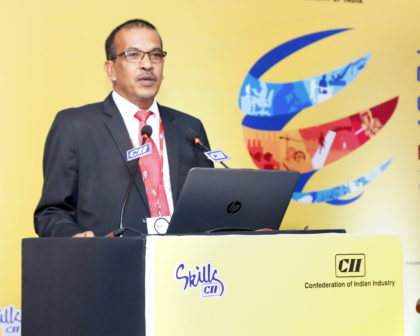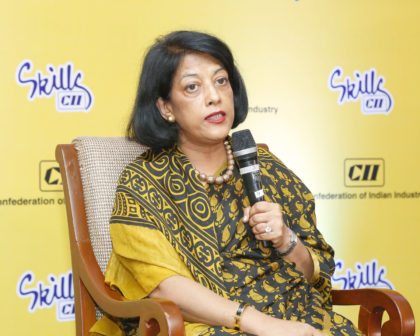This is the second part of the report on the 7th CII Global Summit on Skill Development 2016, held on 9th -10th November at Hyderabad.The report is presented in 4 parts. Click here to read Part 1, Part 3 and Part 4. In this part we present a summary of the proceedings from sessions, 2, 3 and 4.
Session II: Right Skills for the Right Jobs – Discussion on India Skills Report 2017 as a major match making initiative, capturing the skill levels of the supply side and the needs of the demand side of the talent supply chain. The session was chaired by Pankaj Bansal, Co-Founder and CEO, PeopleStrong.
Session highlights: Key points discussed in the session
- Key findings of the India Skills Report in terms of employability and availability of skilled workforce
- Participation of Engineering colleges in PMKVY by sharing infrastructure
- Need for mobilising and counselling women with regard to employment options
 Mr. Nirmal Singh Founder – CEO, Wheebox
Mr. Nirmal Singh Founder – CEO, Wheebox
 Mr. Nirmal Singh presented the highlights of the India Skills Report by mentioning that the insights are based on largest sample size. The report is based on the study of the colleges with questions like: what skills are available (based on test) and a survey of employers – what skills and qualifications, what jobs are anticipated next year. Till today, there has been a voluntary participation of 630000 students, from 5800 colleges. Following are some of the key findings of the Report:
Mr. Nirmal Singh presented the highlights of the India Skills Report by mentioning that the insights are based on largest sample size. The report is based on the study of the colleges with questions like: what skills are available (based on test) and a survey of employers – what skills and qualifications, what jobs are anticipated next year. Till today, there has been a voluntary participation of 630000 students, from 5800 colleges. Following are some of the key findings of the Report:
- 40% employable; marginally women more employable
- Maharashtra number 1 state for employable candidates, followed by Andhra Pradesh
- 80% employers want non-cognitive skills (in addition to technical skills)
- Most repetitive jobs will not remain, hence, institution should impart critical thinking and communication skills
- 7 to 10 % will be hiring – core engineering (power and mines) and telecom sectors (services)
- 40 % employers have a mandate for hiring women and 65% hiring will be in 0-5years segment
- Colleges should focus on alumni network
Dr. Alok Prakash Mittal – Member Secretary, AICTE
Dr Alok Mittal talked about the need for engineering colleges to participate in skilling initiatives for generating larger impact. He reiterated the directive from government when said that under PMKVY, all engineering colleges should share the infrastructure for skill development of unemployed youth. As per the latest reports, 1000 institutions are implementing this mandate and 80000 youth are selected for training.
Mr. Clement Chauvet, Chief – Skills and Business Development, UNDP, India
Mr. Clement Chauvet narrated his experience of partnering for surveys and research to create India Skills Report. He also touched upon some key issues related to women’s employment:
- The impact women can make with gender inclusivity and how it is important to mobilize and counsel women, by quoting an example from Jindal steel plant where women get on the job training in the factory
- Need to educate women who lack information on career opportunities; they should not be limited to seeking jobs in just food processing and stitching
- Career guidance and counselling centers that would be started with SNDT university for helping women find the right jobs
- 60% of employers don’t have focused plan for hiring women
Session III: Towards a Skill Delivery System – Discussion on realigning skilling with the emerging technologies and Industry 4.0. There immense challenges in scaling, how do we reach and with what infrastructure? This session was chaired by Mr Pramod Bhasin
Session highlights: Key points discussed in the session
- Need for holistic understanding of skill development
- Uniform qualification frameworks and promotion of apprenticeships
- Counselling the candidates, particularly from underprivileged sections
- Finding jobs for skilled youth and imparting skills from early childhood
Mr. Nigel Phillips, CEO, Career Life College
Mr. Nigel Phillips reflected on previous discussions and he stated that the issues faced with vocational training are the same around the world. The key focus of his perspective was that we should not fall into the trap of perceiving skill development as disjointed pieces. This calls for some shifts in perception because:
- Fragmented understanding means missing the actual whole system of skill development. There is a need to interconnect all the small parts that fit into the whole.
- Skilling involves changing the system or institutional models; there is a need to look at the core practices that should be changed and address the challenges at the top of the paradigm.
Mr. A B M Khorsed Alam, CEO, NSDC Secretariat, Ministry of Labour and Employment, Bangladesh
Mr. A B M Khorsed Alam spoke about the lack of qualified teachers at the training centers and the lack of organized apprenticeship, besides the disadvantages of theory based curriculum and lack of understanding about the labour market. He emphasized on some key points:
- Qualification frameworks must be the same for all the countries. Collaboration and networking amongst all major countries and training will be done in both online and offline methods.
- Blended learning program should incorporate theory and test in native language
- Networking or micro and small enterprises who can provide on-the job practical learning to be listed for helping online student
- These enterprises are remunerated by the government as the same organizations will take the candidates as apprentices depending on performance in the qualifying test
- Future policy reform for apprentices must insist every industry with 300 people to have apprentices.
Mr. Arun Nalavadi, Head CSR and Sustainability, Magic Bus India Foundation
Mr Arun Nalavadi brought to the fore issues related to handling first generation youth from underprivileged sections who take up skilling courses. He pointed out the need to:
- Fix mindset issues and connect with skills, match interest and aptitude; the youth are mostly unskilled with low confidence and self-esteem
- Connect adolescence learning to livelihood options after education
- Recognize that counselling is critical though it is expensive; proper use of technology can scale it up
- Get employers to from a consortium of skilling and come up with ways to respect skilled workers
Ms Maneesha Chadha, Head, Philanthropic Initiatives, J P Morgan
 The most important aspect of skilling is to find jobs for the trained candidates. This was the focal point in Ms. Maneesha Chadha’s perspective on the theme of this panel. She prioritized the need to look at skilling from the employer’s perspective. While detailing this topic, she brought out the need to:
The most important aspect of skilling is to find jobs for the trained candidates. This was the focal point in Ms. Maneesha Chadha’s perspective on the theme of this panel. She prioritized the need to look at skilling from the employer’s perspective. While detailing this topic, she brought out the need to:
- Start by understanding the jobs and work backwards with what skill training is needed
- Convey the importance of skill development at early childhood stage and whether organizations are equipped to handhold the child till 18 years for securing decent employment
- Collaborate for scaling with (donors, funders, investors – not training partners alone) and other partners who have a comparative advantage
Session IV: Viable and Scalable models – Sharing of Best Practices
How companies have adapted international best practices to Indian job market and demand for skilled workforce. What are the ways to develop sustainable business models for training partners? The session was chaired by Mr. S. Mahalingam.
Session highlights: Key points discussed in the session
- Need for international partnerships in skill development and entrepreneurship
- Best practices from countries like UK, Switzerland and Australia in promoting vocational education and industry-specific training
- Business aspects of skilling with emphasis on practical training and better wages
Mr. Leighton Ernsberger , British Council
Mr Leighton Ernsberger presented his points about how British Council (BC) collaborates with India for research, skill assessments, blended learning while evolving the ecosystem for international partnerships. He also placed on record some key points with regard to enhancing the aspirational value of skills:
- Place of technology in education for vocational skills, for instance, the use of simulations in training
- How apprenticeships programs work in UK and British Council’s partnership with ITIs
- How World Skills Competition can create icons who could become role models and enhance the aspirational value of skills
Mr. Chandra Kumar, CEO, SkillSonics
 Mr Chandra Kumar discussed at length about how skills are the foundation for moving to next level in jobs and they are driven by demand. Looking back at the experience of working with the Swiss VET, he suggested that employers should strive to make the employees ‘thinking ‘ workers who can innovate, design and help in cost cutting. There should be viable options for the job aspirant who wants a job, for the government that provides human capital for industry and for the employer who focuses on ROI. Some of the highlights of Swiss VET include:
Mr Chandra Kumar discussed at length about how skills are the foundation for moving to next level in jobs and they are driven by demand. Looking back at the experience of working with the Swiss VET, he suggested that employers should strive to make the employees ‘thinking ‘ workers who can innovate, design and help in cost cutting. There should be viable options for the job aspirant who wants a job, for the government that provides human capital for industry and for the employer who focuses on ROI. Some of the highlights of Swiss VET include:
- Switzerland Vocational Education is not cheap; 50% of the cost is borne by the government and 50% by industry or the private sector
- The system enables the individual to become a self learner
- Industry drives the course content and assessments in Switzerland
Dr Shubnum Singh, Chairperson, HSSC NOS Approval Committee and CEO, Max Institute of Health Education and Research
 Dr Shubnum Singh discussed the need for applying business thinking and commerce to skill development as this would help in scaling up productivity, sustainable quality and increase in revenues. Her other insights include:
Dr Shubnum Singh discussed the need for applying business thinking and commerce to skill development as this would help in scaling up productivity, sustainable quality and increase in revenues. Her other insights include:
- How mobilizing the youth is the biggest challenge and they are obsessed with the sense of entitlement that goes into formal education and degrees
- Breaking the barrier of associating a Degree with competence; only then we can expect people to appreciate skill development
- There is need to re-look at mobilise-train-place cycle and rethink the practical component of training which usually happens in a 3000 square fee training classroom
- Employers should pay better wages and salaries to the trained workforce and reduce migration
Mr. Sam Freeman, Australian Retail College
Mr Sam Freeman shared the following points about how best practices from Australia can be used in Indian skill development initiatives:
- Using technology for retail training can be very effective
- Training and apprenticeship is an established system in Australia
- Need to create new pathways for learning that point to a career and not just the entry level
- Need for viable business models for sustaining training initiatives













Comments 2